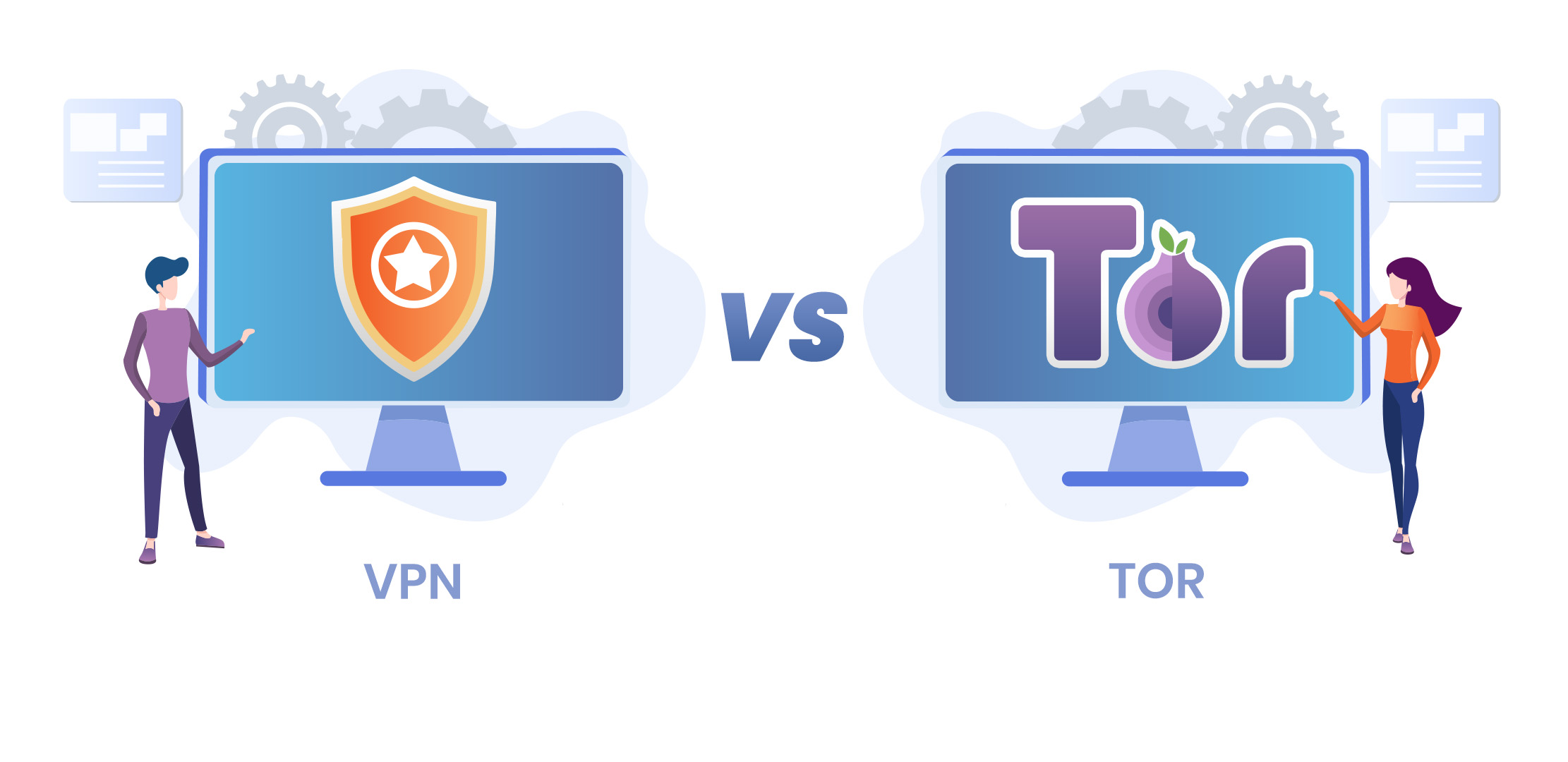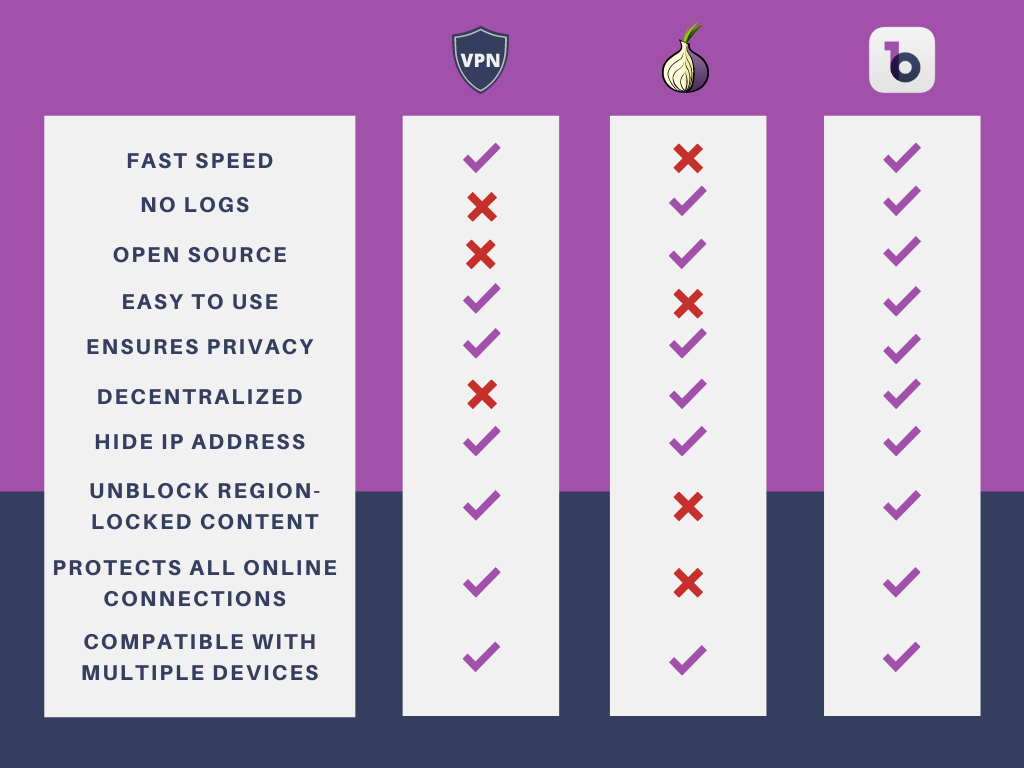Featured
Table of Contents
- – Tor Browser Vs. Vpn: How To Make The Right Choice
- – Vpn Vs Tor Vs Dvpn - What Are The Real Differe...
- – Tor Vs Vpn - What Are They & How Do They Work?
- – Vpn Vs Tor Vs Proxy Servers In 2023: Stay Ano...
- – Difference Between Tor Browser And Tor Over Vpn
- – Tor Vs Vpn: What's The Difference And Which ...
- – Tor Vs. Vpn [2021] – Which Is Best?
- – Tor Over Vpn: Is It Useful If You're Not A W...
Tor Browser Vs. Vpn: How To Make The Right Choice
If you're doing anything questionable, then your web service provider, federal government or anyone else who can access your stream of information can see it. There are various types of servers you can use depending on the traffic you desire to conceal.
HTTP proxies are meant solely for web traffic. You enter the IP address of the proxy you want to connect to in your web browser's settings and traffic will be routed through that server. Other traffic, such as peer-to-peer connections, isn't appropriate for an HTTP proxy. There isn't any file encryption, either not even basic SSL/TLS.

Apart from that, SOCKS proxies have the very same problems as HTTP proxies. There's no file encryption outside what you provide and the traffic load and speed are up in the air. Plus, SOCKS proxy servers have more overhead, so they are generally slower than HTTP. Free proxies are bad for security, however what about paid ones? You 'd think that possibly spending a few dollars for a paid proxy may offer you better security, however that's not truly the case.
Vpn Vs Tor Vs Dvpn - What Are The Real Differences?
Instead, they assist business scrape information from websites. Many corporations blocklist IP addresses originating from other businesses, so those companies need to use proxy servers if they want to obtain that data. That's the real purpose of a paid proxy, and it disappears safe and secure than a complimentary proxy server.
A VPN connection keeps your online activity entirely anonymous. When your encrypted connection reaches the VPN server, it gets decrypted and sent out once again to its destination. The website reacts to your request and sends the reply back to the VPN server, which then encrypts that reply and sends it to you, where it gets decrypted just when it reaches your device.
We'll speak about complimentary VPN services in a bit, however for now, suffice it to state that if you need a VPN, you should use a paid one. The extra expense features extra security, dependability and functions. For example, VPNs can bypass the harshest geoblocks and let you gain access to restricted content across the globe.
Tor Vs Vpn - What Are They & How Do They Work?
VPN services offer the finest balance of security and speed for P2P connections something proxy servers and Tor battle with. If you desire to consistently unclog online material, you need to use a fast and safe and secure VPN like Express, VPN.
While they're meant to protect your personal privacy, a VPN company can see your web traffic and, sometimes, log it. Suppliers such as IPVanish have been captured red-handed logging user information and handing it to the government. You can check out more about that event in our IPVanish review. That stated, Express, VPN and Nord, VPN are examples of providers with a commitment to security and privacy (read our Express, VPN review and Nord, VPN review).


The greatest disadvantage is that a great VPN, in nearly every case, will cost cash. There are uncommon exceptions to this, like Windscribe, Proton, VPN and Tunnel, Bear.
Vpn Vs Tor Vs Proxy Servers In 2023: Stay Anonymous ...
Traffic on the network is secured as well, so it's partially more secure than a proxy. Like proxy servers, Tor exit nodes (the last server your connection bounces off of) are recognizable.
The data can be kept an eye on and the packages counted to identify where the connection is coming from and where it's going.
Tor does not work for P2P connections and is much slower than a proxy or VPN. You're still encrypting your initial connection, but likewise needing to bounce that connection off several servers before reaching your location. The only method to genuinely protect your web traffic is with a VPN. Proxy servers are convenience- and speed-focused options that appropriate for bypassing standard geoblocks, and Tor concentrates on brute-forcing anonymity at the expense of enormous amounts of speed.
Difference Between Tor Browser And Tor Over Vpn
Truly, the only drawback is that you have to pay for a VPN. There's actually no contest between Tor, a VPN and proxy server the VPN constantly wins. For many people, a VPN is the finest choice, but that should not come as much of a surprise. A VPN connection is encrypted, safe and secure and quick.
That does not imply they do not have worth, though. Linking to a VPN through Tor is a slow however efficient service for true anonymity (see our best VPN for Tor), and proxies are a quick and low-priced option for fundamental IP masking. As an all-around option, however, VPNs are best.
Let us understand if you liked the post. That's the only way we can improve. Yes No.
Tor Vs Vpn: What's The Difference And Which Is Safer?
Something went incorrect. Wait a moment and attempt again Try again.
The information can be kept track of and the packets counted to determine where the connection is coming from and where it's going.
Tor does not work for P2P connections and is much slower than a proxy or VPN. Proxy servers are convenience- and speed-focused options that are appropriate for bypassing basic geoblocks, and Tor focuses on brute-forcing privacy at the expense of enormous quantities of speed.
Tor Vs. Vpn [2021] – Which Is Best?

Actually, the only disadvantage is that you need to spend for a VPN. There's truly no contest in between Tor, a VPN and proxy server the VPN always wins. For many people, a VPN is the best choice, but that should not come as much of a surprise. A VPN connection is encrypted, safe and secure and quick.
, and proxies are a fast and affordable option for standard IP masking. As a well-rounded option, though, VPNs are best.
Let us understand if you liked the post. That's the only method we can improve. Yes No.
Tor Over Vpn: Is It Useful If You're Not A Whistleblower?
Something went wrong. Wait a minute and try again Attempt once again.
Table of Contents
- – Tor Browser Vs. Vpn: How To Make The Right Choice
- – Vpn Vs Tor Vs Dvpn - What Are The Real Differe...
- – Tor Vs Vpn - What Are They & How Do They Work?
- – Vpn Vs Tor Vs Proxy Servers In 2023: Stay Ano...
- – Difference Between Tor Browser And Tor Over Vpn
- – Tor Vs Vpn: What's The Difference And Which ...
- – Tor Vs. Vpn [2021] – Which Is Best?
- – Tor Over Vpn: Is It Useful If You're Not A W...
Latest Posts
The Best Vpn Services For Business (Including Small ...
Business Vpn: What Is It And Which One Should You Consider?
9 Best Business Vpns For Work In 2023 - Teambuilding
More
Latest Posts
The Best Vpn Services For Business (Including Small ...
Business Vpn: What Is It And Which One Should You Consider?
9 Best Business Vpns For Work In 2023 - Teambuilding